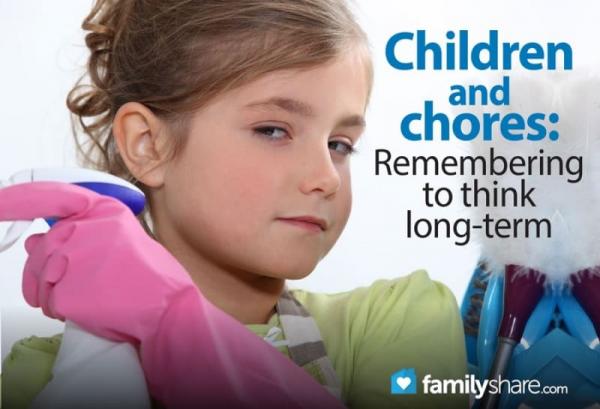
Trees swayed back and forth in the wind, engulfing both sides of the black pavement as I watched my parents drive away. I was off on my own for the first time. I had my own apartment. I had unlimited choices and opportunities, or so I thought. As I started living on my own, I very soon realized that I knew little about taking care of my apartment and myself.
I remember distinctly embarrassingly calling my mother numerous times to ask her basic questions about cleaning, recipes or ingredients. As a child, I was not given chores. My mother insisted on doing the chores and responsibilities around the house. But now, living on my own, I sincerely wish that I was given chores back then. The struggle with children at home to do chores can sometimes cloud the eyes to the long-term desires parents have for their children.
Look forward
According to the authors of How Much is Enough?
, adults who had no chores as children expressed a wish that their parents had actually given them chores. They complained of the skills they missed out on learning. Chores assist in the development of important everyday skills and characteristics. Pause for a moment and picture your child as a grown adult. Has he or she learned the skills needed to efficiently live alone or to take care of a spouse or children? What are you doing now - or what can you start to do - that may help your child?
Long-term responsibility
Most parents desire to raise responsible, happy and confident adults. Responsibility is cultivated through experience. This includes making decisions and mistakes. Teaching children responsibility can begin with chores. Parenting with Love & Logic
,by Foster Cline and Jim Fay, focuses on parents setting firm, loving limits and allowing children to make decisions and mistakes in order to teach the critical skill of responsibility. In relating Love & Logic parenting principles to chores, responsibility develops as children are asked to participate in chores, and as parents allow the consequences of good or poor decisions to occur. Parents should couple those consequences with empathy.
Children are learning what it is to become a responsible being as parents let children make decisions and allow the consequences of those decisions do a portion of the teaching. Responsibility is a process of becoming, and with chores, the doing should only be part of the focus. Providing children with opportunities and decision-making moments with chores will allow them to act and start the process of becoming responsible beings.
When I was 13, I remember sitting in my bedroom one Saturday afternoon reading as my mother put away my washed and folded laundry that she had spent the morning doing. My mother, at that moment in time, could have granted me a valuable learning opportunity.
Developing positive self-concept
Just like parents want responsible children, we want children to be confident and view themselves as capable and worthwhile. In the book, Positive Discipline
,Dr. Jane Nelson discusses encouragement as providing opportunities for children to acquire a view that they are capable and influential. Having children participate in chores provides them with opportunities to develop a positive perception that they are capable at helping and valued as a contributing part of the family.
An example of encouragement could be, "Clark, you polished that rusty facet until it sparkled. You know how to push through difficult tasks. It makes me happy when you do your chores with determination and diligence. You really have been helping out our family as you do your chores with a willing heart."� Involvement in chores will help children develop a positive view of their capabilities that will follow into adulthood.
It may be difficult to see past the scuffles and strains of having your children help with chores. Keep a long-term perspective. Think of the potential adult they will become and the skills they will need and want to know. Remember as children participate in chores that they will be learning valuable life skills, fostering responsibility, and developing a positive view of their capabilities.

